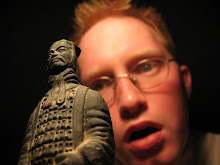
Story 1: China Rising
Where is the China our parents had always told us about? Where are the starving children who would be thrilled to eat the ungodly brusselsprouts we left cold on our plates? I have not yet met a person here in China who appeared starving... and certainly none so desperate to brave brusselsprouts! Famine seems impossible in China. Everywhere I have been, there is more than enough food. Everywhere I have been, I witness how prosperity and modernity are trickling into all corners of Chinese society. China likes to imagine itself as a dragon, but I see a different metaphor... China is the Phooenix that has in three decades emerged from the ashes of economic poverty rising quickly and flying higher-ever-higher. How did this happen?
The kiwi. The kiwi delivered it all. For all the skyscrapers, the new cars, the computers in farmers' homes, and certainly the generation without famine... the kiwi... we can credit it all to the kiwi.
Story 2: the reoccuring kiwi conversation
In all the combined moments of my entire life, I have never thought about the kiwi as much as I have this week. And it was certainly not by my choice. In fact, I hate kiwis. They are ugly on the outside... mushy to chew... and the little back seeds are disturbing (they remind me of larval knats suspended in green goo). If I had any control over the matter, I would never put myself in a corner to have to think so much about this quirky fruit. [Enter fate...]
Monday: I was eating lunch with some students in the student dining hall. Inevitably, our conversation began with the question, "Do you like Chinese food?" Twistedly, it turned to the mystery fruit.
Student: "Do you like that fruit... mmm... what's it called?... nihoutao... do you know it?"
Me:Blank stare.
Student: "Uhhhh, it has green meat."
Me: Green eggs and ham? No... that's can't be it...
Student: "It has hair."
Me: Fruit with green meat and hair.... ooooh... KIWI!
Student: "YES! Kiwi! Do you like it?"
Me: No, not really. Let's change the conversation.
Wednesday: I was chatting with a Chinese teacher on the school track. Again, as is always the circumstance, we were talking about food. Started talking about Sichuan hotpot... next pineapple... and then, "Do you know the fruit that is small, green, and has hair?" Oh yeah, that would be the kiwi. The guessing game cut down to an impressive 5 seconds... nice! We then continued to have a five-minute discussion about how expensive and nutritious kiwis are. Ultimately, it didn't sway me from my dislike of the fuzzy fruit, but it did make me wonder... why so much talk about kiwis all of a sudden?!
Saturday: I went to visit a student's family in Changxing Town over the weekend. On Saturday morning, she invited me to visit her family's field to see the "special vegetable that only grows in Mei County." Sounds interesting... let's go see this mystery vegetable!

We arrive and there it is again... the kiwi!!!!!!!
corrections:
*the kiwi is not a vegetable
*kiwis do not only grow in Mei County
I have learned an important lesson: "kiwi" is the answer to all questions! In all seriousness, though, what is the kiwi trying to tell me?
The Kiwi Connection
Story 2 (cont'd)
Long before the surprise that the mystery "vegetable" was the kiwi, I was initially surprised that my student's family had a field. My assumptions had clouded my judgement. I knew that her father was a truck driver. I knew that her mother was a street vendor. I also knew that her family was relatively poor. How could they afford the land? How could they afford the time to plant anything? How do they live in town if they own land and cultivate crops?
Well, a few clarifications were in order.
1)The land is not far away... not in the distant fields... their plot of land is in the town! Not more than five minutes away from their home. Little plots of land sprawl in a variety of places in Changxing Town.
2)My student informed me that the land was in fact FREE. "All people are given free land by the government," she told me. All people? All people in China? All people in Changxing Town? I never did get a clear answer. Who knows.
3) They do not own the land. There are no property rights (I should have known better). They only own whatever they produce from the land. In addition, they own the right to rent or sell their land for cultivation by others. The land is provided free, but they do not own it. The government may come at any time to grant the land to other enterprises for housing, commerce, roads, mining, larger-scale agriculture, etc. In such a case, the people will be compensated by whoever has successfully petitioned to use the land for any of the above designated purposes.
4) The family dabbles in such a wide variety of economic activities BECAUSE OF this situation. In other words, because their plot of land is so small and because it can be taken away at any time, they are prudent to dive into other industries. And this is why you will see people who not only harvest corn but also sell coca cola... people who not only harvest cabbage and red peppers but also sell noodles and operate a laundry 7 days a week... people who not only harvest kiwis but also drive trucks and sell food at night. Venture capitalists by circumstance.

The Liu Family plot and it's kiwis... do you see all the kiwis in the trees? do you see all the crates already filled to the brim? There 8,000 kiwis ripe to juice the Chinese economy!
On this one small plot of land, there were 8,000 kiwis. Recalling my conversation with the teacher about how expensive kiwis are, I realized that this small plot of land was certainly worth something. No wonder this humble family had a computer, a cell phone, and enough jiaozi to stuff my stomach to its limits!
And everywhere I looked, I saw this plot of land and its kiwi fruits prompting more commerce. The family could not harvest the 8,000 kiwis alone. There were a half-dozen helpers... labor paid in paper or personal currency, but currency nevertheless. And then there was a man sitting in the shade of the kiwi grove scribbling notes into his little book. This man was watching the harvest because he had arranged to purchase it... a middleman... more money flowing. We followed the kiwis back to the middleman's warehouse. More laborers helping transport, unload, and pack the kiwis.... more money flowing. We were standing there for no more than 10 minutes--no lie--and two young men approached the warehouse looking for the boss. They were strolling about Changxing Town on a mission from somewhere in Sichuan Province... they were interested in buying the kiwis... for sale in Sichuan or perhaps for sale all over Chna. Was the entire economy of China flowing through Changxing Town? .... was the entire economy of China springing from this small plot of kiwis cultivated by the Liu Family?
Story 1 (cont'd)
I don't care what my many Chinese friends say; Mao Zedong devastated China. He rescued China from a condition of anguish perpetuated by his predecessors only to drag it through the mud for a few more decades under his own regime. His successor Deng Xiaoping, however, brought China a genuine Great Leap Forward. China is still leaping... many thanks to Comrade Xiaoping!
Deng Xiaoping initiated a series of critical reforms to Mao's brand of socialism. And the first of his "Four Modernizations" concentrated on agriculture. No longer would people plant, cultivate, and harvest only what they were told... no longer would they surrender the yields of their labor to the community. With Deng Xiaoping's reforms, although property rights still belonged to the state, farmers everywhere began again to own the consequences of their economic decisions. They did not own the land, but they did own what they could do with the land. Inevitably, some farmers abandoned rice, wheat, corn, and other staples... perhaps they planted cash crops... like kiwis, for example...
What happened? All kiwis and no rice? A famine? Not at all! There was more food than before. And farmers' incomes began to rise. How is this possible? Well, in fact, farmers continued to plant and harvest the staples. But they worked extra to plant the cash crops. They made decisions based on comparative advantage (after all, some plots of land, soils, climates, and local cultures of expertise are best suited to cultivate kiwis, for example) and had personal-profit incentives to work extra (listen to the economic engines roar!). The result was so predictable... more food... more money.
As a cash crop, Kiwis are an excellent symbol of the decisions that farmers made... and of the solid and far-reaching success of those decisions. And then the dominoes of Mao's ideological fortress of socialism began to fall... if the first of Deng Xiaoping's "Four Modernizations" could be this successful, why not give the other three a try? If market forces in agriculture eliminated hunger and put money in the pocket, perhaps market forces in other industries could deliver the same promise?
Indeed they did. The kiwi has awakened the sleeping dragon. They kiwi has nourished the rising phoenix.
(And I have discovered a new appreciation for the "green meat," "hairy" fruit... but I still won't eat the things!)
Supplementary commentary: This entry exhibits a strong confidence in the market system... and this confidence is unshaken even by the wave of events currently smashing economies all over the world. The relevant conversation now focuses on the vulnerabilities of the market system and the need for more regulation. This is a useful and necessary conversation. Yet in my own contribution to the dialogue, I continue to advocate for the market system.
Regulation is a short-term fix. If regulations are appropriate and minimal, they can work quite well. If they are excessive or over-burdensome, however, they do more damage than the unbridled wild markets could ever dream to do. There is a fine line that separates these two categories of regulation... and in many cases "unintended consequences" come with crossing that line. Shall we take the risk?
In response to the housing and credit market crises, policymakers are understandably getting involved. As I said, a little involvement can be beneficial, but too much can be devastating. U.S. policies should remember the lesson of the kiwi... ultimately, let people own the consequences of their economic decisions. In the long run, they will make the best decisions. If you regulate the finance and/or housing markets too much, you limit their future potential or set them on a track to make alternative mistakes in the future. If you bail out the banks and the homeowners, you strip them of the consequences that would inform future decisions... you set up these people to repeat the mistakes.
Don't force people to plant kiwis, let them plant kiwis themselves. And let people reap what they sow! The harvests will be much better, I guarantee you!





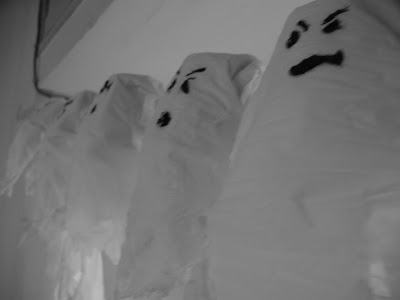













 "Golden Week" Traffic...When 1.6 billion people travel, you have to wait just a little bit longer.
"Golden Week" Traffic...When 1.6 billion people travel, you have to wait just a little bit longer.


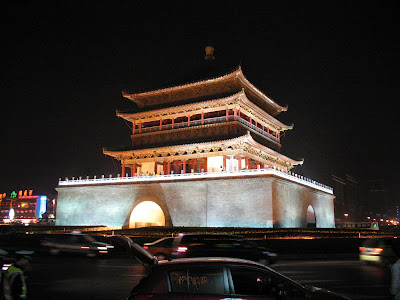







 This is the notorious "Singapore Asshole" (above, center singing). Master of the art of singing and scamming. If you are ever in Xi'an in the nightclub district, avoid this snake enterpreneur.
This is the notorious "Singapore Asshole" (above, center singing). Master of the art of singing and scamming. If you are ever in Xi'an in the nightclub district, avoid this snake enterpreneur.

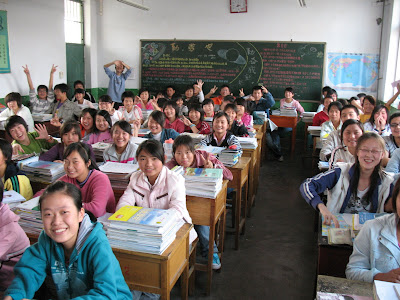
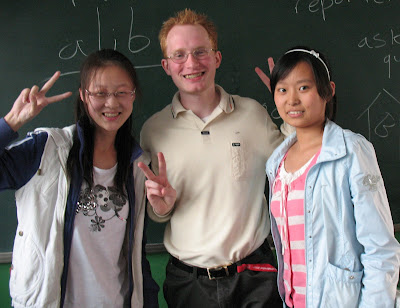

 the noodle magician of HuaiYa at her craft (above)
the noodle magician of HuaiYa at her craft (above)